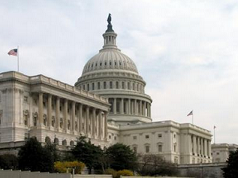Encryption-Protection Bill Introduced

A bipartisan quartet of House members has introduced the Ensuring National Constitutional Rights for Your Private Telecommunications (ENCRYPT) Act of 2016, which would preempt state and local laws banning cell phone encryption circumvention.
Reps. Ted Lieu (D-Calif.), Blake Farenthold (R-Texas), Suzan DelBene (D-Wash.), and Mike Bishop (R-Mich.) introduced the bill Wednesday (Feb. 10), pointing out that California and New York have introduced bills that would effectively ban, or at least allow for circumvention of, encryption on smart phones sold in the state.
Encryption prevents someone other than a cell phone's owner from accessing its information.
That can prevent lost or stolen phones from giving up that info to bad actors, but law enforcement officials say it can also prevent them from going after even worse actors, like terrorists, and have argued they need ways around encryption in cases of national security or life threatening situations.
“A patchwork of 50 different encryption standards is a recipe for disaster that would create new security vulnerabilities, threaten individual privacy and undermine the competitiveness of American innovators,” said Lieu.
“It is bad for law enforcement, bad for technology users, and bad for American technology companies. National issues require national responses. The ENCRYPT Act makes sure that this conversation happens in a place that does not disrupt interstate commerce."
"A patchwork of state laws on encryption will not make us safer. Rather, they open us up to attacks, and weaken our national security, not strengthen it," said DelBene.
Broadcasting & Cable Newsletter
The smarter way to stay on top of broadcasting and cable industry. Sign up below
Information Technology and Innovation Foundation (ITIF) VP Daniel Castro said state and localities should not be "mandating that companies tamper with the security of their products and services so that government can get access to encrypted user data."
He said the U.S. needs "a uniform policy that encourages the use of encryption, not a patchwork of state policies trying to limit it. The digital economy transcends state lines, and U.S. policy should as well. If states go their own way on encryption policy, it would fragment the U.S. market and interfere with digital commerce. This has to be a national issue.... The United States should be embracing strong encryption, not trying to cripple it."
Berin Szoka of nonprofit tech think tank TechFreedom, cautioned that Congress "should be careful about preempting state laws," but said that the Internet is inherently an interstate medium and "there’s just no reason that states or localities should have any role in regulating Internet services or devices — the way that California, in particular, has been able to impose its regulatory agenda on other states on a host of Internet regulation issues.”
He is also worried that, ENCRYPT Act or no, the FCC could step in and ban encryption if it defined messaging apps like Snapchat as a telecommunications service, as it has Internet access (in its Title II-based Open Internet order). He said the best way to prevent that was for Congress to take that option off the table by reclassifying broadband as an information service
Contributing editor John Eggerton has been an editor and/or writer on media regulation, legislation and policy for over four decades, including covering the FCC, FTC, Congress, the major media trade associations, and the federal courts. In addition to Multichannel News and Broadcasting + Cable, his work has appeared in Radio World, TV Technology, TV Fax, This Week in Consumer Electronics, Variety and the Encyclopedia Britannica.

